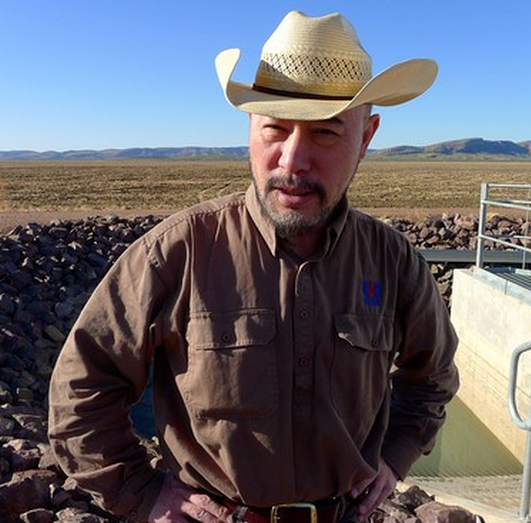 |
| Yin Jianzhong inspects irrigated farmland under development in Australia's far-flung Kimberley region. Yin is the Australia-based head of Chinese conglomerate Shanghai Zhongfu's ambitious A$700 million Outback project. ROB TAYLOR/THE WALL STREET JOURNAL (Read More) |
Communist China buys Australia
- The Communists are on the march and are bankrolling the massive purchase of Australian ranches, mines and businesses.
- Australia is to act as a food and raw materials colony for their new Lords and Masters in Communist China.
- The moronic Australians are selling off their nation to Communists for a few fast dollars in profit. With those purchases the Communists gain huge political and economic influence inside Australia.
(Framland Grab.org) - CHINESE investors have spent a quick-fire $120 million in the last two months buying rural properties across Australia and the signs are that the buying spree is only the beginning, with more than $1 billion worth of deals in play.
After a disappointing foray into Australia's resources sector Chinese investors have taken a far more cautious approach to agriculture but are now finally starting to act, buying a $40 million farm every fortnight for the past two months.
Chinese groups were identified as far back as 2012 as the next major group of foreign investors for rural Australia, but aside from Shandong Ruyi buying Australia's largest cotton irrigator Cubbie Station for $232 million it took three years to see a serious buying spree by the Chinese.
Dashang Group, Hailiang Group, Fucheng Group, Tianma Bearings Group and New Hope have outlaid about $260 million since March on rural holdings and production.
There are more Chinese investors waiting at the farm gate. They include one of China's largest beef producers, Chongqing Hondo Agriculture Group, which is looking to buy up to $100 million worth of cattle stations in Australia.
They also include Pengxin's listed subsidiary, Dakang Farming, along with Shanghai CRED, financial services group Zendai and textile, property and logistics conglomerate Shanshan Group who are all said to have shown interest in Australia's largest land holder S. Kidman & Co or the Terra Firma backed Consolidated Pastoral.
Austrade's trade commissioner in Chengdu, Jeff Turner, said in May that the line-up of Chinese interests was extensive, with as many as 300 Chinese cattle and cattle-related companies looking to invest in Australia.
However it is the comments of Chinese buyers that have fuelled the hopes of farm vendors, agents, bankers and lawyers all looking to do deals with the Chinese giants.
The chairman of New Hope Group, Liu Yonghao, who has pledged to invest $500 million in Australian agriculture over the next three years said China's land was seriously overloaded, with too much fertiliser degrading the land. "Australia has a vast landmass, good grasslands and sunshine," he said. "It is our hope to bring Australia's beef and mutton into the market of China. We should say these investments are beneficial to Australia and China."
With the recent increase in Chinese investment, local law firms who have represented Chinese buyers say such investors are now making fewer mistakes. "Early investors who came in made substantial losses as a result of their inexperience," Holding Redlich partner Brian Healey said. "They are much more savvy than they were three or even two years ago. They study our social, legal and political systems very carefully."
 |
| Australians will become landless Serfs working the estates of their foreign Lords in China. |
His colleague, Holding Redlich partner Carl Hinze, who speaks Mandarin and has worked for a decade in China, said Chinese investors in Australia were looking to diversify from commercial and residential investment into agriculture.
"Their initial investments abroad are about doing what they know best, investing in commercial and residential property, but the scale in the Australian market is so much smaller than what they are used to in China, so they then diversify into areas they are not so familiar with, and the classic area is agriculture," Mr Hinze said.
"We see it especially with Chinese property developers and that's not a surprise given what has happened with the property market in China where the risk-return profile has recently changed," Mr Hinze said.
"They are looking for more secure investments abroad now that the investment returns on property in China are trending down. It's about combining the commercial objective of pursuing profit-making opportunities with the added benefit of achieving China's food security objectives."
Mr Hinze said it is likely that a large percentage of Chinese investors in Australian agriculture will want to bed down their investments in the next 18 months and "seek to collaborate effectively with Australian management."
Thynne + Macartney partner Bill Loughnan said that while the Chinese were astute deal makers and also faced more hurdles including foreign investment review board approvals, some farm vendors should not be waiting forever for the magical Chinese investor.
"One particular issue in today's environment is whether aspiring vendors are prepared to wait for the foreign investors to come out of the woodwork to do a deal where they could get good values," Mr Loughnan said.
Read More . . . .

































